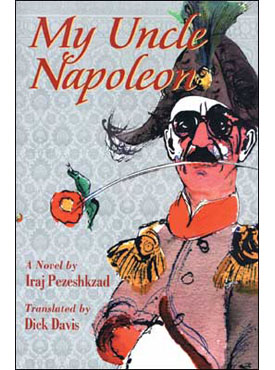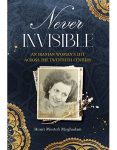About the Book
“The existence in Persian literature of a full-scale, abundantly inventive comic novel that involves a gallery of varied and highly memorable characters, not to mention scenes of hilarious farcical mayhem, may come as a surprise to a Western audience used to associating Iran with all that is in their eyes dour, dire and dreadful.” (From the Preface)
Set in a garden in Tehran in the early 1940s, where three families live under the tyranny of a paranoid patriarch, My Uncle Napoleon is a rich, comic and brilliantly on-target send-up of Iranian society. The novel is, at its core, a love story. But the young narrator’s delicate and pure love for his cousin Layli is constantly jeopardized by an unforgettable cast of family members and the hilarious mayhem of their intrigues and machinations. It is also a social satire, a lampooning of the widespread Iranian belief that foreigners (particularly the British) are responsible for events that occurs in Iran. But most of all it is a very enjoyable, often side-splitting read that you wish did not have to end. First published in Iran in the early 1970s, the novel became an all-time best-seller. In 1976 it was turned into a television series and immediately captured the imagination of the whole nation-its story became a cultural reference point and its characters national icons. Dick Davis’ superb English translation has not only captured the uproarious humor of the original but has also caught the delicate, underlying vibrancy of the Persian.
Kindle Preview:
Reviews
“An uproarious and endearing Iranian novel… one of the most entertaining books we’re likely to see this year.”
– – Kirkus Reviews
“A giddily uproarious mixture of farce and slapstick.”
– – The Atlantic Monthly
“My Uncle Napoleon should leave properly adjusted American readers desperate for more of this howlingly funny — not to mention tender, salacious and magical — Iranian import.”
– – Cleveland Plain Dealer
“My Uncle Napoleon is a surprising novel, a raunchy, irreverent, hilarious farce wrapped around a core of quiet sorrow.”
– – The Washington Post
“It is so surely told, so funny, true, and ultimately heart-rending, it’s absolutely clear why My Uncle Napoleon is loved in its homeland.”
– – The Baltimore Sun
“Readers can gain a more balanced impression of Iran from perusing this novel, which looks at life from the kind of humorous perspective few Westerners may associate with the current regime in that country.”
– – Christian Science Monitor
“The farcical plot dashes along at a rapid pace and there is never a dull stretch. In this English version, much of the reader’s enjoyment comes from the outstanding quality of the translation.”
– – Choice
“My Uncle Napoleon gives the reader an amusing, satirical picture of life among the privileged and their servants in Tehran at the beginning of World War II.”
– – The Washington Times
“The translation is so sensitive to the author’s tone and to the levels of language used by the characters that the Western reader, unfamiliar with Iran, needs only a minimum of help to enjoy and appreciate both the comic and serious aspects of the book.”
– – World Literture Review
Excerpt
Chapter One (pages 23-24)
One hot summer day, to be precise, one Friday the thirteenth of August, at about a quarter to three in the afternoon, I fell in love. The bitterness and longing I’ve been through since have often made me wonder whether if it had been the twelfth or the fourteenth of August things would have turned out differently.
That day, as on every day, they had compelled us-meaning me and my sister-by force and threats and a few golden promises for the evening to go into the cellar in order to sleep. In the savage heat of Tehran an afternoon siesta was compulsory for all the children. But on that day, as on every other afternoon, we were just waiting for my father to fall asleep so that we could go into the yard to play. When my father’s snores became audible I stuck my head out from under the coverlet and glanced at the clock on the wall. It was half past two in the afternoon. In waiting for my father to go off, my poor little sister had fallen asleep herself. I’d no choice but to leave her and I tiptoed out alone.
Layli, my uncle’s daughter, and her little brother had been waiting in the main garden for us for half an hour. Our two houses had been built within one big enclosure and there was no wall between them. As on every day, we settled down quietly to our games and conversation in the shade of a big walnut tree. And then I happened to catch Layli’s eye. A pair of wide black eyes looked back at me. I couldn’t tear my gaze away from hers. I’ve no idea how long we’d been staring at each other when suddenly my mother appeared standing over us with a little multi-thonged whip in her hand. Layli and her brother ran off to their house and my mother drove me into the cellar and under the coverlet, threatening me as she did so. Before my head was completely hidden under the coverlet I looked across at the clock on the wall; it was ten to three in the afternoon. Before she in turn put her head under the coverlet my mother said, “Thank God your uncle didn’t wake up, because if he had, he’d have torn you all to pieces.”
My mother was right. Dear Uncle (as we called him) was very particular about the orders he gave. He’d given an order that before five o’clock in the afternoon the children weren’t so much as to breathe. Within the four walls of that garden it wasn’t only we children who had learned what not sleeping in the afternoon and making a noise during Dear Uncle’s siesta meant; the crows and pigeons appeared in the garden much less often because Dear Uncle had taken a hunting rifle to them a few times and effected a general slaughter. The street vendors of our area didn’t go through our street, which was named after Dear Uncle, till five o’clock, because three or four times the man who came by on his donkey selling melons and onions had been slapped by Dear Uncle.
But that day my brain was working overtime and the name of Dear Uncle didn’t put me in mind of his rages and bad temper. I couldn’t get free of the memory of Layli’s eyes and of her gaze even for a moment, and no matter how much I tossed and turned and how much I tried to think of something else, I saw her black eyes, brighter than if she were really there in front of me.
That night, underneath the mosquito net, Layli’s eyes came after me once more. I hadn’t seen her again that evening, but her eyes and her beguiling gaze were there.
I don’t know how much time passed. Suddenly a weird thought seized my whole brain, “God forbid, I’ve fallen in love with Layli!”
About the Author
About the Translator
Dick Davis brings a unique array of gifts to the challenges of translating Hafez and his contemporaries. In his own right, he is a poet of great technical accomplishment and emotional depth. He is also the foremost English-speaking scholar of medieval Persian poetry now working in the West. Numerous honors testify to his talents. In the U.K., he received the Royal Society of Literature’s Heinemann Award for his second book of poems, Seeing the World, in 1981; his Selected Poems was chosen by both the Sunday Times and the Daily Telegraph as a Book of the Year in 1989; and his collection Belonging was selected as the Poetry Book of the Year by The Economist in 2003. In the U.S., A Kind of Love—the American edition of his Selected Poems—received the Ingram Merrill prize for “excellence in poetry” in 1993. He has received awards for his scholarship from the Arts Council of Great Britain, The British Institute of Persian Studies, and the Guggenheim Foundation, and he is the recipient of grants for his translations from the National Endowment for the Humanities and the National Endowment for the Arts. Twice, in 2000 and 2001, he received the Translation Award of the International Society for Iranian Studies, and in 2001 he received an Encyclopedia Iranica award for “services to Persian poetry.” His translation of Ferdowsi’s Shahnameh: the Persian Book of Kings was chosen as one of the “ten best books of 2006” by the Washington Post.
Davis read English at Cambridge, lived in Iran for eight years (he met and married his Iranian wife Afkham Darbandi there), then completed a PhD in Medieval Persian Literature at the University of Manchester. He has resided for extended periods in both Greece and Italy (his translations include works from Italian), and has taught at both the University of California and at Ohio State University, where he was for nine years Professor of Persian and Chair of the Department of Near Eastern Languages, retiring from that position in 2012. In all, he has published more than twenty books and is a Fellow of the Royal Society of Literature.
Among the qualities that distinguish his poetry and scholarship are exacting technical expertise and wide cultural sympathy—an ability to enter into distant cultural milieus both intellectually and emotionally. In choosing his volume of poems Belonging as a “Book of the Year” for 2006, The Economist praised it as “a profound and beautiful collection” that gave evidence of “a commitment to an ideal of civilized life shared by many cultures.” the Times Literary Supplement has called him “our finest translator of Persian poetry.” In 2009 Mage published a book of Dick Davis’s own poems about Iran: At Home and Far From Home: Poems on Iran and Persian Culture. His book about the Shahnameh, Epic and Sedition was published by Mage in paperback in 2006. His books of translations are: Borrowed Ware: Medieval Persian Epigrams (1998), The Shahnameh (2004); The Legend of Seyavash (2004); Rostam: Tales of Love and War from Persia’s Book of Kings (2007); Vis and Ramin (2008); Faces of Love: Hafez and the Poets of Shiraz (2012).









